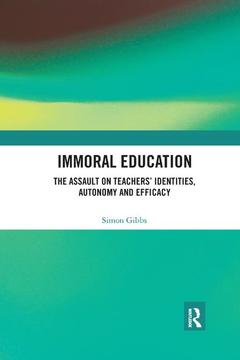Immoral Education The Assault on Teachers’ Identities, Autonomy and Efficacy
Auteur : Gibbs Simon

This book brings together for the first time a synthesis of philosophical and psychological material to examine the basis for the professional identity that teachers might believe in, and the effects of misunderstanding and mistreating these beliefs. By critically synthesising findings from a range of sources, the book provides a rationale that argues an essential ingredient of good education is the quality of teachers who have a reaffirmed sense of creativity, autonomy and agency. The book presents a role for educational psychology in informing educational and inclusive processes, filling a longstanding need for a text that delineates the way psychological phenomena underpin education.
Beginning by considering notions of ?self? and ?identity?, the book explores the relationship between our identity as defined by ourselves, but also as defined by others in the social and professional groups we may or may not be considered as being part of. It looks critically at how the erosion of the professional identity of teachers has affected education, and considers the morality of ?othering? ?others? and its damaging effect on teachers and young people. Gibbs reflects on the organisational structure and leadership of schools, the psychology of these institutions, and the barriers that need to be overcome in order to promote greater inclusivity within them.
Offering a careful and insightful look at the psychology behind education and teaching, this is an essential read for teacher educators, researchers and academics in the field of education and will appeal to policy makers, teachers and educational psychologists.
Introduction
Chapter 1: Selves and Identities
Chapter 2: Others, Othering and Dialogue
Chapter 3: Teachers’ Professional Identities and Autonomy
Chapter 4: Categories, Labels and Stereotypes
Chapter 5: In- and Out-groups: Segregation and Exclusion
Chapter 6: Leadership, Efficacy and Inclusion
Chapter 7 Conclusions
Simon Gibbs is Reader in Educational Psychology at Newcastle University.
Date de parution : 07-2019
15.6x23.4 cm
Disponible chez l'éditeur (délai d'approvisionnement : 14 jours).
Prix indicatif 50,12 €
Ajouter au panierDate de parution : 03-2018
15.6x23.4 cm
Thèmes d’Immoral Education :
Mots-clés :
Anne Jordan; education; Gert Biesta; psychology; Performative Regime; wellbeing; Efficacy Beliefs; inclusion; Recent UK Government; otherness; Henri Tajfel; teachers; Collective Efficacy Beliefs; identity; Sen Child; role; Mr Gradgrind; efficacy; Professional Development; creativity; Ofsted Team; autonomy; Parfit’s Work; Collective Efficacy; Current Educational; Primo Levi’s Book; Natural Kinds; Inclusive Education; Responsive Creators; Brown Eyed Children; Functional Group Formation; Teacher Identity; Attention Deficit Hyperactivity Disorder; Professional Agency; Interactive Kinds; Black Caribbean Heritage



